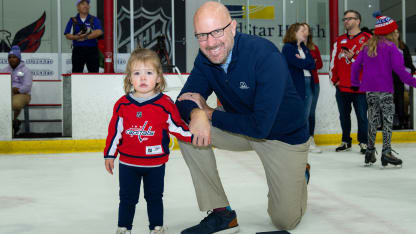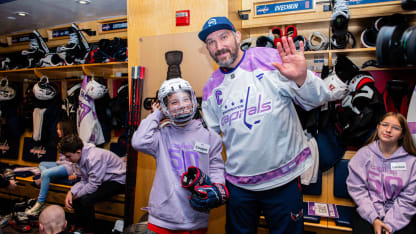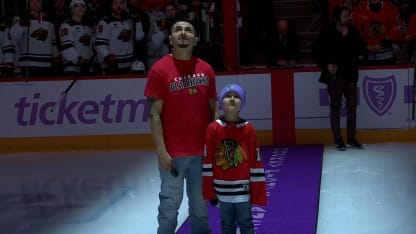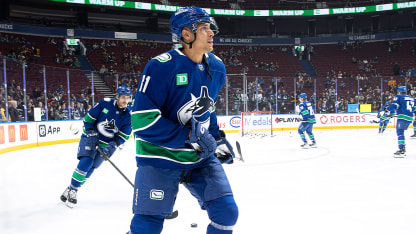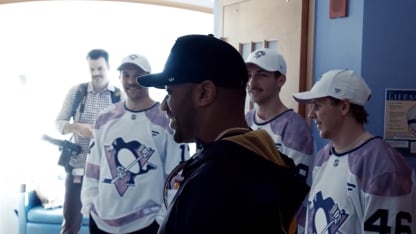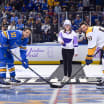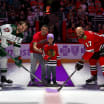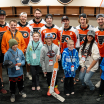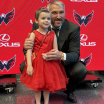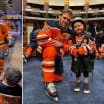ARLINGTON, Va. -- John Walton has always appreciated the significance of the Washington Capitals’ annual Hockey Fights Cancer Night game during his 14 seasons as their radio play-by-play announcer.
Walton’s appreciation will be more personal, though, for the event this year when the Capitals host the Colorado Avalanche on Thursday (7 p.m. ET; KUSA, MNMT, ALT, SNP, SNO, SNE).
The 51-year-old was diagnosed with colon cancer after a colonoscopy on July 29.
“It has a lot of meaning to me,” Walton said. “I’ve had people who have already had their ‘I Fight For’ signs with my name on it. Every time I see it, it kind of locks me up a little bit. It’s just a weird feeling, I guess. I know that I had a chance and an opportunity to do some good here and I told the organization from the beginning, because I’m out front and people know who I am around this team, it was a chance to save lives.”
Fortunately, Walton’s cancer was caught in Stage 1, meaning it was confined within his colon and hadn’t spread to his lymph nodes, and after having surgery on Aug. 28 to remove about a foot of his colon, he was designated cancer-free. There were some worry-filled days after his initial diagnosis and surgery, though, while he awaited the report that the cancer had been completely removed.
That stress was compounded by the development of compartment syndrome -- the buildup of pressure within a muscle compartment, cutting off the blood supply to muscles and nerves -- in Walton’s left leg. That required emergency surgery to relieve the pressure and extended his stay at MedStar Washington Hospital Center to nine days.
Walton’s wife, Jen, juggled caring for their 20-month-old daughter, Madison, at home and spending time with him at the hospital. It wasn’t until Walton’s hospital stay ended that they learned the good news that the cancer hadn’t spread to his lymph nodes and he would not require chemotherapy.
He still faced months of recovery from the surgeries on his colon and leg along with physical therapy for his leg, but said he is getting stronger each day.
“There are days that with the travel it wears you out more than it normally would,” Walton said. “There’s still some pain with my leg walking and getting on planes and stuff, but a little better every day. That’s been the biggest thing is there is progress. It was always going to be a long haul in terms of energy.
“Even though the surgery was as successful as it could’ve been, it’s a big surgery and a lot of things that need to heal. But, certainly, on track here to be 100 percent some time hopefully midseason.”
For Walton and the rest of the Capitals broadcast family, Hockey Fights Cancer hit close to home when Linda Laughlin, the wife of Monumental Sports Network television analyst and former Capitals forward Craig Laughlin, was diagnosed with uterine serous carcinoma, a rare and aggressive form of uterine cancer, in 2018. Walton was part of the support system then.
He experienced its therapeutic benefits firsthand after announcing his diagnosis on X, formerly Twitter, on the eve of his surgery. Walton was flooded with encouraging texts and calls from around the hockey world. They included messages from the Capitals players, coaches, staff, and fans and as well from other teams.
“You always look out for each other and care for one another,” Capitals defenseman John Carlson said. “I think that’s what makes the organization great is we do have those relationships. That’s how things go in here and how we come together whether that’s John, who is a direct person in here, or someone’s parents or someone’s uncle.”
One of the first messages Walton received came from Eddie Olczyk, an analyst for TNT and Seattle Kraken telecasts and a former NHL forward. Olczyk was diagnosed with Stage 3 colon cancer (meaning it spread to nearby lymph nodes, but not to other parts of his body) in August 2017 and required six months of chemotherapy, but he has been cancer-free since March 2018.
“There’s a lot of good people in this world and, in hockey especially,” Walton said. “It got me through. ‘Edzo,’ he had Stage 3 and I had Stage 1, but I didn’t know it at the time. And I was able to take it step by step with someone who had been there before, and that meant the world to me.”
Olczyk, a Hockey Fights Cancer ambassador, understood well what the positive wishes meant to him when he went through his battle, particularly when they came from those who had gone through it themselves. So, he made himself available to Walton for whatever questions he had.
“Johnny is a terrific guy,” Olczyk said. “He reached out to me when I was ill, and it just means a lot. You just want to let somebody know with support. It is different when it’s somebody that’s been in the battle that called me, no disrespect to anyone else that was healthy. It’s just important to let people know they’re not alone.
“It does test your will to live regardless of the stage, and I’m so happy that they were able to get it and get it early and get him on the right side. I can’t wait to see him and give him a hug.”
Walton was determined from the start that he would be back at work for training camp in September and, despite the compartment syndrome complication, he was able to do that. As Carlson noted, “You wouldn’t know by looking at him” that Walton is less than three months removed from surgery.
Like Olczyk, Walton also wanted to use his fight with cancer to help others, which is why he posted on social media about it before his surgery.
His message then was the same as it is now: “Don’t put off getting screened.” The Centers for Disease Control and Prevention recommends getting your first colonoscopy at age 45. Walton acknowledged he almost waited too long for his first.
“I didn’t have a thing wrong with me,” he said. “I thought this was going to be breeze in, breeze out, see you in 10 years and I, for a time, was in the fight of my life. … The test is not fun. I don’t care. Do it. And if you do it and it saves even one life because you got it in time, much was like I was fortunate enough to be OK, then I feel I get some reward.”
So, Walton’s story will be part of the Capitals’ Hockey Fights Cancer Night with a video being played on the arena’s center-ice video screen and an interview on Monumental Sports Network during the telecast. He will have a follow-up colonoscopy once a year for at least the next three years, but knows he was fortunate.
“I should’ve gone sooner,” Walton said. “It was probably growing in me for 10 years, they said. It was slow growing. It had been there for a long time, and it had grown to the point where it was pretty big. Even a year later, it probably would’ve been where [Olczyk] was. That’s the message: Get screened. Man, woman, it doesn’t matter. Colon cancer does not discriminate.
“If you’re 45, get checked. If you’ve got a history in your family, go sooner. That’s also the message.”
